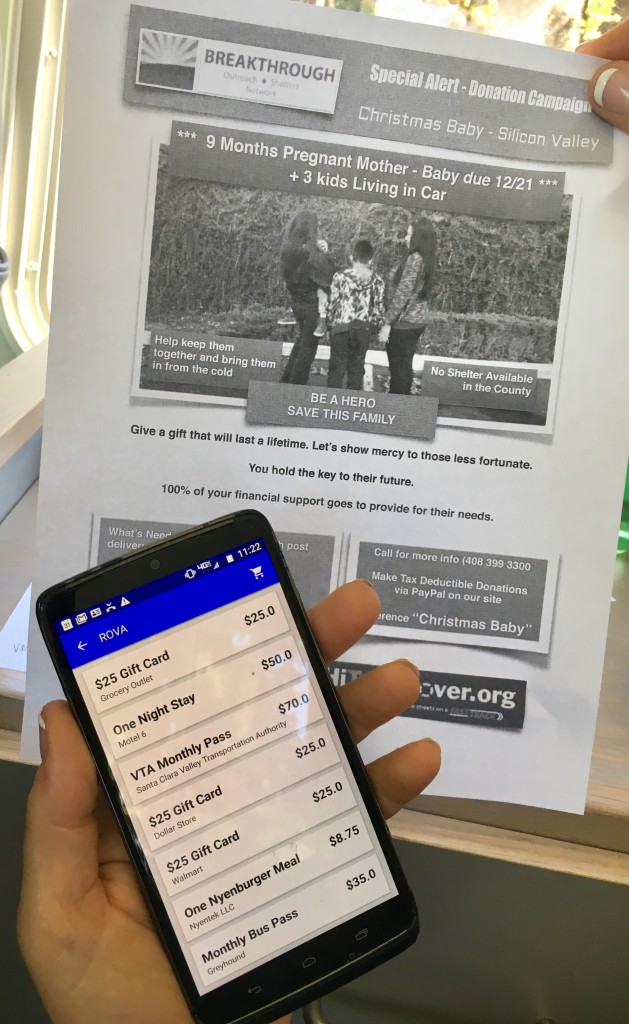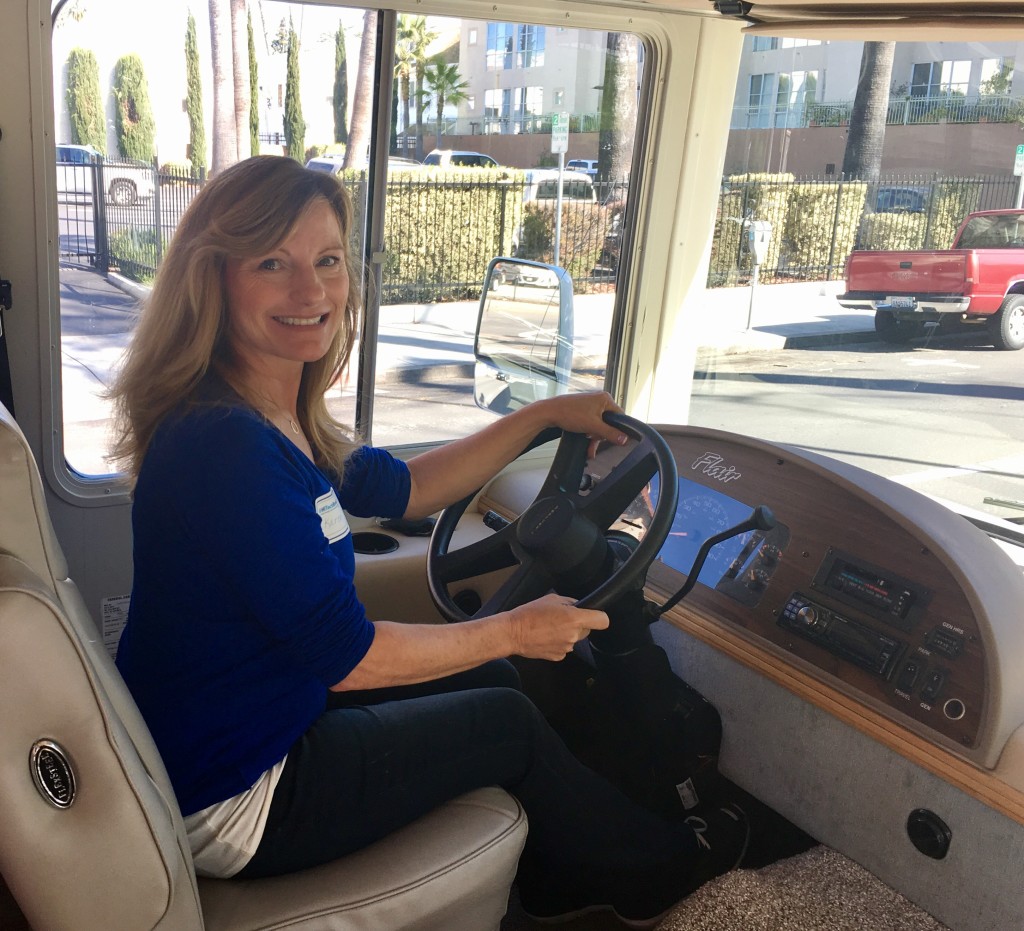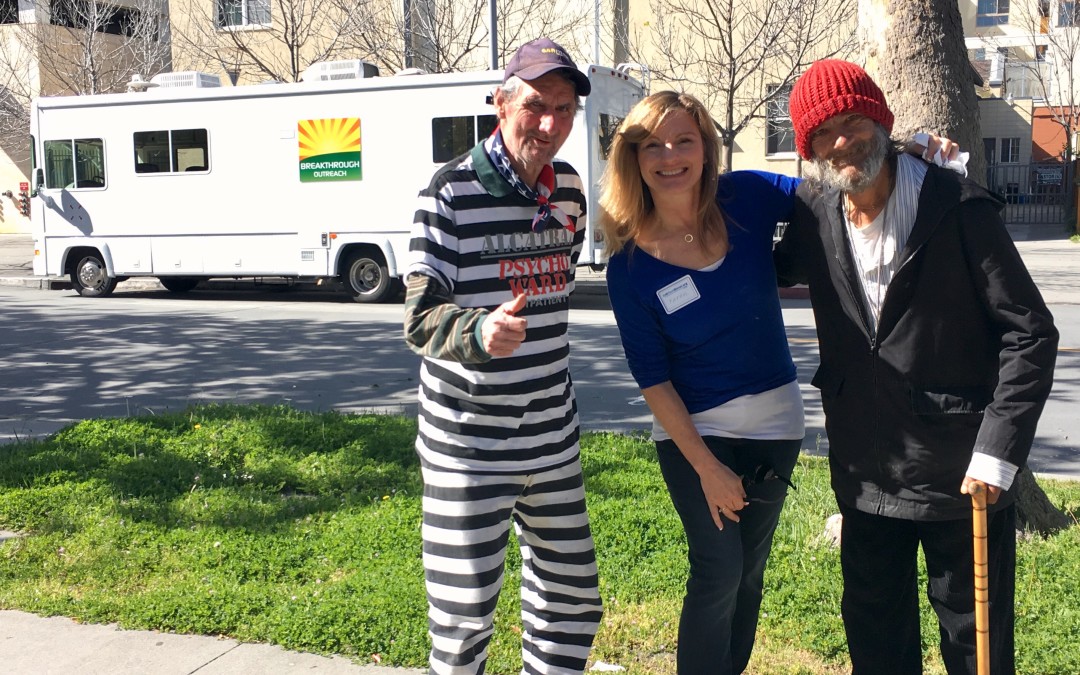Imagine if you could help end homelessness with the click of a button. There’s an app for that! In Silicon Valley, despite the vast affluence and many tech millionaires, homelessness is a huge problem. With average home prices close to a $1 million and tiny flats renting for well over $1,000, making ends meet can be challenging; and for some people, just finding a roof over their heads is mission impossible.
Alison van Diggelen, host of Fresh Dialogues met one woman whose homeless brother inspired her to change all that.
“For those who are homeless and poverty stricken, it’s like having a life coach, a service provider and a trainer in the palm of their hands. There’s really something to teaching to fish…rather than giving fish…helping them be self sufficient rather than temporary handouts… We’re here trying to help in other ways that are more sustainable and that lead to a permanent resolution of the problem.” Karen Addato, Founder of Hi Tech Rover and ROVA app.
Here’s my BBC World Service report. It aired April 4th on the BBC’s World Tech program, Click. Listen @15:40 for Host, Gareth Mitchell’s introduction on the April 4th BBC Podcast or to this short clip:
Alison van Diggelen: I’m here on the Hi Tech Rover, an RV (large camper van) that brings both the internet and a safety net to homeless people all over San Jose. Karen Addato (founder of the Hi Tech Rover and the ROVA app) and her volunteers offer an opportunity for homeless people to get off the streets and reboot their lives. They offer Internet training, help with online job applications, housing search, and even access to detox services.
Karen, where are we going right now?
Karen Addato: We’re in downtown San Jose, the Capital of Silicon Valley and we’re going to a couple of encampments under bridges, right here in the heart of town. One of them is on Woz Way…
Alison van Diggelen: Woz as in Steve Wozniak, cofounder of Apple and generous philanthropist here in Silicon Valley. Karen Addato is a vivacious single mom, a mortgage broker and executive director of the nonprofit: High Tech Rover. She used $7,000 of her savings to create this Rover Outreach Vehicle App prototype, ROVA for short.
Karen Addato: For those who are homeless and poverty stricken, it’s like having a life coach, a service provider and a trainer in the palm of their hands… when we’re not here helping them, they can stay on a pathway focused on upward mobility. They can get on to ROVA and press one button.. “I am seeking help.” Up comes a list of resources available for that gender and age group. We have a geo-tracker right here, so you can find out where they are…This tool will also help government officials, donors, and service providers figure out what’s needed and what’s not.
 Alison van Diggelen: Connecting homeless people with jobs, training opportunities and relocation information are a key for Addato. Her brother Stevie was homeless in Boston, and she believes that those who supported his panhandling simply enabled his alcoholism and homelessness. Instead, she’s serious about connecting people to local services, and getting people off the streets for good.
Alison van Diggelen: Connecting homeless people with jobs, training opportunities and relocation information are a key for Addato. Her brother Stevie was homeless in Boston, and she believes that those who supported his panhandling simply enabled his alcoholism and homelessness. Instead, she’s serious about connecting people to local services, and getting people off the streets for good.
Karen Addato: I’ve learned a lot in my time in the trenches working with this population…I’ve learned a lot through the life and tragic death of my brother…There’s really something to teaching to fish…rather than giving fish…helping them be self sufficient rather than temporary handouts… that in some ways is part of the problem. We’re here trying to help in other ways that are more sustainable and that lead to a permanent resolution of the problem.
Alison van Diggelen: The High Tech Rover – a huge camper van – is kitted out with desks and laptops. Addato and her volunteers take it to homeless camps around Silicon Valley.
Atmos: Sound of walking to homeless camp…traffic…
Alison van Diggelen: We make our way over rough ground to the confluence of Highways 280 and 87. Addato grabs her pepper spray, just in case. We find a half dozen scruffy tents stretched out along a concrete embankment. Below us: the Guadalupe River. Above us, although it’s midday, there’s a constant drone of heavy traffic.
Jason, whose name has been changed to protect his privacy, tells me he’s been homeless for 2 years. He’s 19 and working two jobs, earning between 11 and 17 dollars an hour…
Alison van Diggelen: You can’t get a decent roof over head with that?
Jason: Not in Silicon Valley, it’s too expensive…one bed’s like $1300, it’s crazy out here. Us teenagers, we need help. Not all of us want to be here forever.
Alison van Diggelen: Every morning, Jason has to find a place to shower and clean up for his service jobs. We tell him about Karen’s app. Would that be a useful tool?
Jason: That’s actually a very brilliant idea, because a lot of us actually have phones… I’ve actually wanted something like that. Keep helping!
Alison van Diggelen: I ask another young man, what would help him?
 Charlie: San Jose needs to lower how much it costs to buy a house, their rents…you need to live with like three people, making at least $20 an hour to end up being able to have your own place in San Jose.
Charlie: San Jose needs to lower how much it costs to buy a house, their rents…you need to live with like three people, making at least $20 an hour to end up being able to have your own place in San Jose.
Alison van Diggelen: The ROVA app includes a database of over 700 low-income housing facilities in the county. Both young men plan to relocate out of state when they can afford it.
Like many in Silicon Valley, Addato dreams big and is seeking sponsorship from the tech community to launch her app, and create a whole fleet of High-Tech Rovers across the nation. She recently pitched her dream at the Apple campus and remains hopeful. The wider tech community is already tackling homeless via brainstorming hackathons; leveraging data-driven solutions and social media to spotlight community challenges. In Australia, an app called “Ask Izzy” already offers similar services to ROVA.
![]()
Read more BBC Reports at Fresh Dialogues
Join the conversation on Facebook
Check out the Fresh Dialogues iTunes podcast




